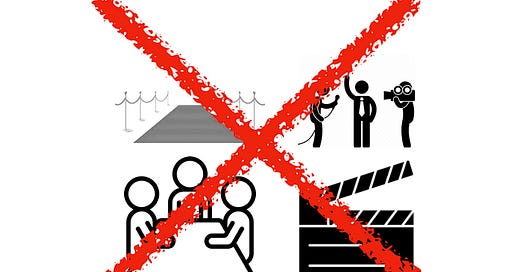The SAG-WGA strikes in Hollywood are going to have devastating effects on the economy, show business and its members. When production shuts down, there is a ripple effect. Hotels, restaurants, transportation systems and small local businesses are all affected.
With the WGA strike alone, the labor action was costing the local economy $30 million a day, an estimate they calculated by applying inflation to an analysis of the financial toll of the 2008 writers’ strike. That 100-day walkout cost the region $2 billion, according to the Los Angeles County Economic Development Corporation. Now add SAG to the equation, and things get even worse.
The strikes in Hollywood are going to have a huge impact on the fall festival season as well, from the smaller indies to the Oscar candidates. Independent films rely on critical acclaim, and word-of-mouth marketing. The limited availability of promotional opportunities and reduced media coverage could make it more challenging for these films to gain visibility and find their audience.
Traditionally, Telluride kicks things off Memorial Weekend, leading into Venice and then Toronto. In addition to being top tier fests for film aficionados, these events have become PR junkets for most of the prestige pictures released by the studios before Oscar voting begins.
One prominent example of the strike's impact can be seen in the premiere of the highly anticipated film, Oppenheimer, where director Christopher Nolan revealed that the star-studded cast had joined the strike. The cast literally walked out on the screening, once the strike became official.
Of course, film festivals are about discovery and most of the participating films won’t be competing for Oscars. Yet, we can’t deny that publicity helps to generate buzz, and with these new strike rules, WGA writers and SAG actors will not be permitted to do interviews or walk the red carpet.
Keep reading with a 7-day free trial
Subscribe to On the Circuit to keep reading this post and get 7 days of free access to the full post archives.




